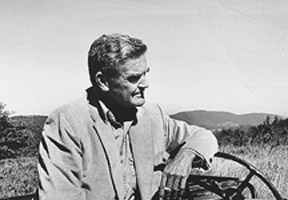
John Atlee Kouwenhoven in Vermont. Photo (c) Russell Lynes
John Atlee Kouwenhoven was born December 13, 1909, in Yonkers, New York, the son of John Bennem Kouwenhoven, a doctor, and Grace Atlee Kouwenhoven. He received an A.B. in 1931 from Wesleyan University, an M.A. in 1933 from Columbia University, and a Phd. from Columbia in 1948. From 1932-1936 he was a Master in English at the Harvey School in Hawthorne, New York. Kouwenhoven married for the first time in 1935, and he and his first wife Eleanor W. Hayden had two children, Ann S. Kouwenhoven, who was born in 1937 and who died in 1956, and Gerrit W. Kouwenhoven, who was born in 1939.
After his first marriage, Kouwenhoven became an Instructor in English at Bennington College from 1936-1938, and was a member of the literature faculty at Bennington from 1938-1941. At that time, he moved with his family to the outskirts of New York City, where he worked as an assistant editor and then an associate editor for Harper's Magazine from 1941-1946. In 1946 Kouwenhoven joined the faculty at Barnard College, becoming an Associate Professor, and beginning a career of writing about American art, architecture and popular culture. Made in America: The Arts in Modern Civilization was published by Doubleday in 1948, and Kouwenhoven was a contributing author to Creating an Industrial Civilization, published by Harper, 1952.
Kouwenhoven's book A Columbia Historical Portrait of New York was published by Doubleday, 1953, and he was again a contributing author to American Panorama, published by New York University Press in 1957. In 1958, Kouwenhoven and his first wife were divorced, and in June of 1960, Kouwenhoven married Joan Vaczek Arthur at the Union Theological Seminary in New York. In 1960, Kouwenhoven and Vaczek moved, together with Kouwenhoven's stepchildren, Elizabeth Arthur an Andrew Arthur to Pleasantville, New York, where in 1961, Kouwenhoven's best-known work, The Beer Can by the Highway: Essays on What's American About America was published by Doubleday.
In 1963, Kouwenhoven was a co-editor of When Women Look at Men published by Harper. In 1964, Kouwenhoven edited The New York Guide Book published by Dell, and was also a contributor to American Studies in Transition, University of Pennsylvania Press, 1964. During this time, he continued to teach at Barnard College, and he was a member of the Society for the History of Technology, the Royal Society of Arts, the American Studies Association and the Society of Architectural Historians. In 1967 Kouwenhoven and his wife moved full time to a farm in Rupert Vermont, from which Kouwenhoven commuted to the city to continuing teaching, until his retirement from Barnard in 1975.
Over the course of his life, Kouwenhoven served as the Director of Historical Files, Brown Brothers Harriman and Company, and as a Trustee for the Rhode Island School of Design, the Jennie Clarkson Home for Children, and the Vermont Forest and Farmland Foundation. He was also the recipient of the Officer's Cross from the Order of Orange-Nassau, the Netherlands. His last published work, Half A Truth is Better Than None: Some Unsystematic Conjectures on Art, Disorder and American Experience was published by the University of Chicago Press in 1982, and the manuscript of a unfinished work on the Eads Bridge was gifted to the Smithsonian Institution after his death in Manchester Vermont on November 1, 1990. Kouwenhoven's obituary appeared in the New York Times on November 4, 1990.
Elizabeth Ann Arthur / Robert Arthur, Jr. / Joan Vaczek Kouwenhoven / John Atlee Kouwenhoven / Steven Bauer